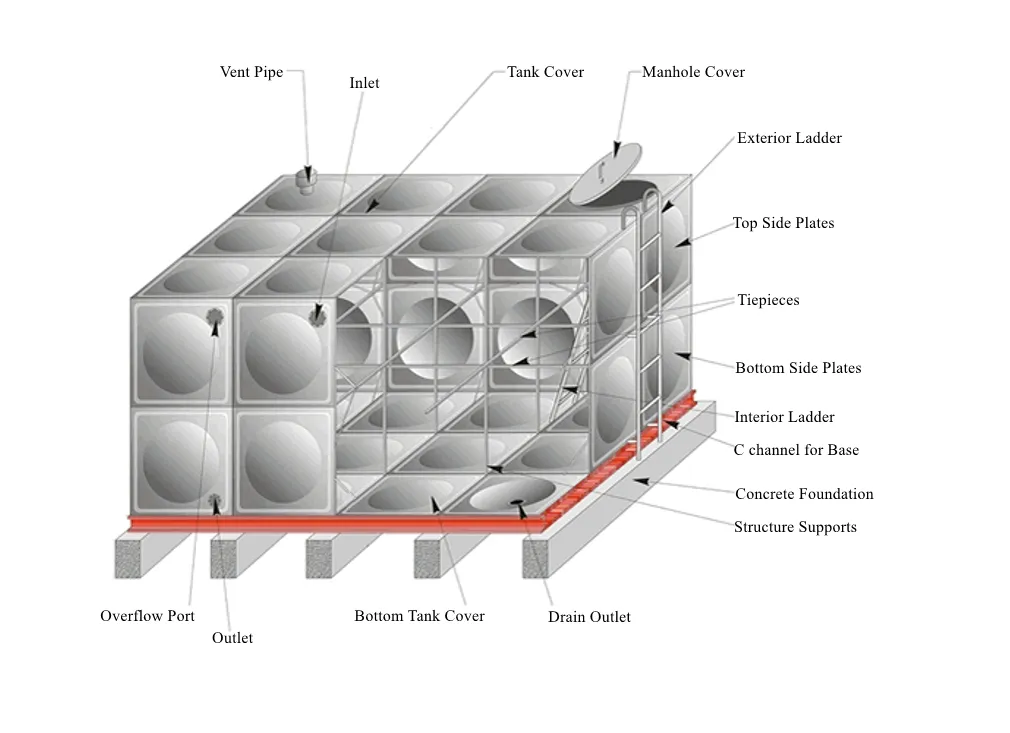loading...
- No. 9, Xingyuan South Street, Dongwaihuan Road, Zaoqiang County, Hengshui, Hebei, China
- admin@zjcomposites.com
- +86 15097380338
- Welcome to visit our website!
FRP Pressure Vessel Design and Applications in Industrial Storage Solutions
FRP Pressure Vessel Tanks A Comprehensive Overview
Fiber-Reinforced Plastic (FRP) pressure vessel tanks are increasingly becoming the go-to solution for various industrial applications. The unique properties of FRP materials make them suitable for environments where traditional materials might falter. This article explores the benefits, applications, and considerations regarding FRP pressure vessel tanks.
What is FRP?
FRP is a composite material made of a polymer matrix reinforced with fibers, commonly glass or carbon. This combination results in a material that is both lightweight and incredibly strong. One of the most significant advantages of FRP is its resistance to corrosion, which is vital for pressure vessel tanks that may come into contact with aggressive chemicals or harsh environmental conditions.
Benefits of FRP Pressure Vessel Tanks
1. Corrosion Resistance One of the standout features of FRP is its ability to withstand corrosive substances. Unlike steel or other metals, FRP does not rust or deteriorate when exposed to chemicals, making it ideal for storing acids, alkalis, and other corrosive agents.
2. Lightweight FRP tanks are significantly lighter than traditional steel pressure vessels. This reduction in weight not only eases the transportation and installation process but can also lead to cost savings in terms of support structures and foundations.
3. High Strength-to-Weight Ratio Despite being lightweight, FRP exhibits remarkable strength. This characteristic enables manufacturers to produce thinner walls without compromising structural integrity, allowing for more efficient use of materials.
4. Thermal Insulation FRP has excellent insulation properties, which can help maintain the temperature of the fluids contained within the vessel. This feature is particularly beneficial in processes involving temperature-sensitive chemicals.
5. Design Flexibility The manufacturing process of FRP allows for versatile design options. Tanks can easily be molded into various shapes and sizes, accommodating specific requirements for industrial applications.
Applications of FRP Pressure Vessel Tanks
FRP pressure vessel tanks are utilized across various industries, including
frp pressure vessel tank

- Chemical Processing Due to their corrosion resistance, these tanks are perfectly suited for the storage and transport of a wide range of chemicals, including acids and solvents.
- Water Treatment FRP tanks are commonly used in water treatment facilities for mixing and storage processes because they do not leach harmful substances into the water.
- Oil and Gas In the oil and gas sector, FRP tanks are used to store and transport various fluids, reducing the risk of leaks and environmental contamination.
- Pharmaceuticals The pharmaceutical industry values FRP tanks for their ability to maintain sterile conditions and prevent contamination, which is critical for drug production processes.
Considerations for Using FRP Pressure Vessel Tanks
While FRP pressure vessel tanks offer numerous advantages, several considerations should be addressed
1. Temperature Limitations FRP materials have specific temperature limits. Exceeding these limits can compromise the structural integrity of the vessel, leading to potential failures.
2. Pressure Ratings Depending on the application, it is essential to select the appropriate pressure rating for the FRP tank. This involves thorough analysis and adherence to industry standards.
3. UV Exposure Some FRP materials can degrade when exposed to UV radiation over extended periods. Therefore, proper coatings or protective measures should be implemented when tanks are installed in outdoor environments.
4. Cost While FRP tanks can provide long-term savings, the initial investment is often higher than that of traditional materials. Companies must weigh upfront costs against the potential benefits over the lifecycle of the product.
Conclusion
FRP pressure vessel tanks represent a significant advancement in storage and transport solutions across various industries. Their unique properties — including corrosion resistance, lightweight design, and thermal insulation — make them an attractive option for many applications. However, it is crucial to consider their limitations and ensure proper selection, design, and maintenance practices. As technology advances, the use of FRP pressure vessel tanks will likely continue to grow, offering innovative solutions to meet the challenges of modern industries.
-
The Rise of FRP Profiles: Strong, Lightweight, and Built to LastNewsJul.14,2025
-
SMC Panel Tanks: A Modern Water Storage Solution for All EnvironmentsNewsJul.14,2025
-
GRP Grating: A Modern Solution for Safe and Durable Access SystemsNewsJul.14,2025
-
Galvanized Steel Water Tanks: Durable, Reliable, and Ready for UseNewsJul.14,2025
-
FRP Mini Mesh Grating: The Safer, Smarter Flooring SolutionNewsJul.14,2025
-
Exploring FRP Vessels: Durable Solutions for Modern Fluid HandlingNewsJul.14,2025
-
GRP Structures: The Future of Lightweight, High-Performance EngineeringNewsJun.20,2025
